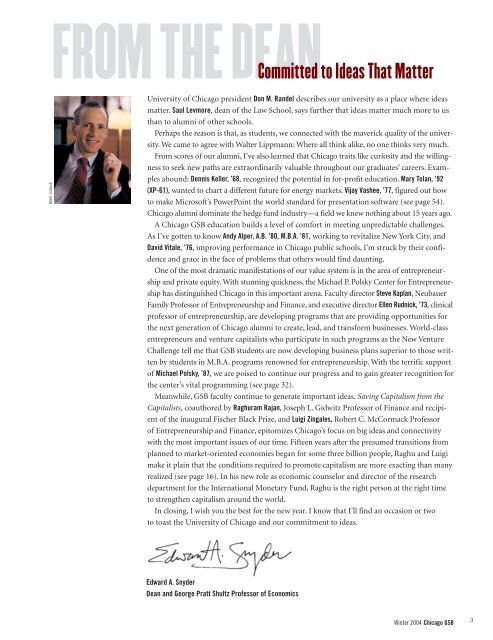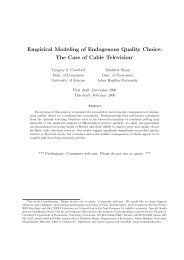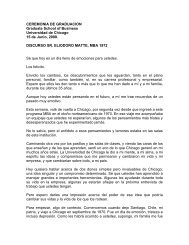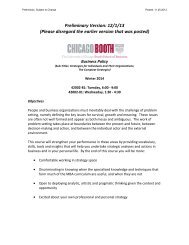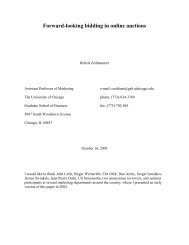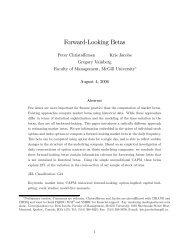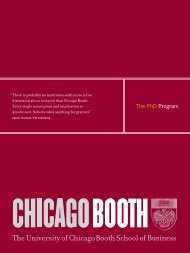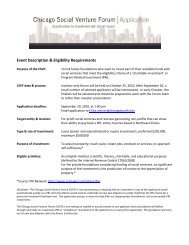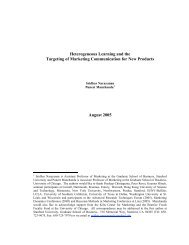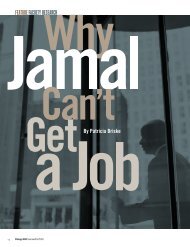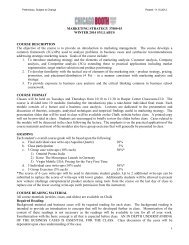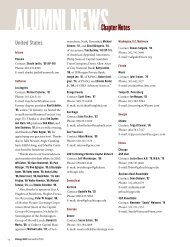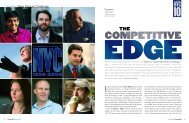Wi front - The University of Chicago Booth School of Business
Wi front - The University of Chicago Booth School of Business
Wi front - The University of Chicago Booth School of Business
- No tags were found...
Create successful ePaper yourself
Turn your PDF publications into a flip-book with our unique Google optimized e-Paper software.
FROM THE DEANCommitted to Ideas That MatterMark Joseph<strong>University</strong> <strong>of</strong> <strong>Chicago</strong> president Don M. Randel describes our university as a place where ideasmatter. Saul Levmore, dean <strong>of</strong> the Law <strong>School</strong>, says further that ideas matter much more to usthan to alumni <strong>of</strong> other schools.Perhaps the reason is that, as students, we connected with the maverick quality <strong>of</strong> the university.We came to agree with Walter Lippmann: Where all think alike, no one thinks very much.From scores <strong>of</strong> our alumni, I’ve also learned that <strong>Chicago</strong> traits like curiosity and the willingnessto seek new paths are extraordinarily valuable throughout our graduates’ careers. Examplesabound: Dennis Keller, ’68, recognized the potential in for-pr<strong>of</strong>it education. Mary Tolan, ’92(XP-61), wanted to chart a different future for energy markets. Vijay Vashee, ’77, figured out howto make Micros<strong>of</strong>t’s PowerPoint the world standard for presentation s<strong>of</strong>tware (see page 54).<strong>Chicago</strong> alumni dominate the hedge fund industry—a field we knew nothing about 15 years ago.A <strong>Chicago</strong> GSB education builds a level <strong>of</strong> comfort in meeting unpredictable challenges.As I’ve gotten to know Andy Alper, A.B. ’80, M.B.A. ’81, working to revitalize New York City, andDavid Vitale, ’76, improving performance in <strong>Chicago</strong> public schools, I’m struck by their confidenceand grace in the face <strong>of</strong> problems that others would find daunting.One <strong>of</strong> the most dramatic manifestations <strong>of</strong> our value system is in the area <strong>of</strong> entrepreneurshipand private equity. <strong>Wi</strong>th stunning quickness, the Michael P. Polsky Center for Entrepreneurshiphas distinguished <strong>Chicago</strong> in this important arena. Faculty director Steve Kaplan, NeubauerFamily Pr<strong>of</strong>essor <strong>of</strong> Entrepreneurship and Finance, and executive director Ellen Rudnick, ’73, clinicalpr<strong>of</strong>essor <strong>of</strong> entrepreneurship, are developing programs that are providing opportunities forthe next generation <strong>of</strong> <strong>Chicago</strong> alumni to create, lead, and transform businesses. World-classentrepreneurs and venture capitalists who participate in such programs as the New VentureChallenge tell me that GSB students are now developing business plans superior to those writtenby students in M.B.A. programs renowned for entrepreneurship. <strong>Wi</strong>th the terrific support<strong>of</strong> Michael Polsky, ’87, we are poised to continue our progress and to gain greater recognition forthe center’s vital programming (see page 32).Meanwhile, GSB faculty continue to generate important ideas. Saving Capitalism from theCapitalists, coauthored by Raghuram Rajan, Joseph L. Gidwitz Pr<strong>of</strong>essor <strong>of</strong> Finance and recipient<strong>of</strong> the inaugural Fischer Black Prize, and Luigi Zingales, Robert C. McCormack Pr<strong>of</strong>essor<strong>of</strong> Entrepreneurship and Finance, epitomizes <strong>Chicago</strong>’s focus on big ideas and connectivitywith the most important issues <strong>of</strong> our time. Fifteen years after the presumed transitions fromplanned to market-oriented economies began for some three billion people, Raghu and Luigimake it plain that the conditions required to promote capitalism are more exacting than manyrealized (see page 16). In his new role as economic counselor and director <strong>of</strong> the researchdepartment for the International Monetary Fund, Raghu is the right person at the right timeto strengthen capitalism around the world.In closing, I wish you the best for the new year. I know that I’ll find an occasion or twoto toast the <strong>University</strong> <strong>of</strong> <strong>Chicago</strong> and our commitment to ideas.Edward A. SnyderDean and George Pratt Shultz Pr<strong>of</strong>essor <strong>of</strong> Economics<strong>Wi</strong>nter 2004 <strong>Chicago</strong> GSB3
LETTERSTo the EditorAn Employer’s Perspective on RaceI don’t at all doubt the accuracy <strong>of</strong>Ms. Bertrand’s research, methods, orconclusions. I would say this as a businessowner <strong>of</strong> many years: If I hire awhite person who doesn’t work out,I can let him/her go without a highprobability <strong>of</strong> conflict. If it’s a black,I will almost certainly be hearing froma lawyer regarding a discriminationsuit and/or <strong>of</strong>fering a substantial settlementproposal to avoid costs <strong>of</strong> litigation.Bertrand might think aboutthe business person acting in selfdefenseon this issue.J. Ottenheimer, ’70 (XP-26)River Forest, IllinoisIs Affirmative Action to Blame?That naked prejudice still infects thiscountry comes as no surprise, butstill causes a deep sadness and an evendeeper determination to combat itsinsidiousness. Even so, perhaps somethingelse is also afoot. Did companieswith nationally recognized strongdiversity programs (such as FannieMae, for example) or companieswith significant African Americanownership also display a tendencytoward resumé name discrimination?I’m speculating that companies maybe discounting the achievements <strong>of</strong>African Americans on resumés owingto the effects <strong>of</strong> affirmative action.That is, companies may be assumingthat the true underlying capabilities<strong>of</strong> two otherwise on-paper-equalindividuals aren’t equal because <strong>of</strong> thename being tied, by extension, to affirmativeaction programs. <strong>The</strong> attemptto compensate for this kind <strong>of</strong> discountingby slightly increasing certainstrengths <strong>of</strong> African American–namedresumés probably is too minimal tomake a difference (as confirmed bythe study). In any case, to discriminatesolely based on a name (and therefore,by implication, race) is a disgustingand illegal practice. If even pro-diversitycompanies do the same thing, they arejust as guilty (and even more so) butmight be sending us a subtle message<strong>of</strong> what happens in the real world’sevaluation <strong>of</strong> achievements.David Ochroch, ’86Arlington, VirginiaAre Candidates Equally Qualified?Could it be that affirmative actionat universities is partly to blame forthe disparities found in Ms. Bertrand’sstudy? Affirmative action is perceivedto be a system in which weaker candidatesare given preferential treatmentover more qualified candidates tocompensate for socioeconomiccircumstances.If we take candidates with similaracademic credentials, but identify someas potential recipients <strong>of</strong> affirmativeaction, are they equally qualified?Chris Fama, ’91<strong>Chicago</strong>Questioning the PremisesI am sure Ms. Bertrand was wellintentioned, but the study appears tobe based upon a number <strong>of</strong> flawedpremises.First, the idea that equivalent educationcredentials and equivalent jobexperience should signal equal skill isprobably not right. Compare the averageSAT scores for black and whitegraduates <strong>of</strong> the <strong>University</strong> <strong>of</strong> <strong>Chicago</strong>.A Flood <strong>of</strong> Feedback: Pr<strong>of</strong>essor Marianne Bertrand’sresearch on race discrimination by employers (“WhyJamal Can’t Get a Job,” Summer/Fall 2003) drew a largeresponse from readers. If you missed the story, read itonline at gsbwww.uchicago.edu/news/gsbchicago.While affirmative action may be laudable,it destroys the signaling value <strong>of</strong>credentials for minorities. Affirmativeaction is just as present in corporateAmerica as in educational institutions,so the signaling value <strong>of</strong> work experienceand job titles is diminished as well.Employers want to make money andthey want the best employees they canget for the amount <strong>of</strong> money that theyspend. Create an environment whereblacks can accurately signal their valueto employers and they will get treatedmore fairly. If Bertrand’s premise isright, firms that systematically hiremore blacks should be able to get betteremployees at lower cost and generatehigher pr<strong>of</strong>itability. Prove that thatis occurring and you will have resultsworth publishing.Edward E. Maran, ’87Santa Fe, New MexicoA Quantitative Approach?<strong>The</strong> Bertrand and Mullainathan studypurports to measure racism in businesshiring in general and “how discriminationcontinues to affect thecorporate landscape” in particular.Actually, it does no such thing. <strong>The</strong>pr<strong>of</strong>essors could not identify most hir-4<strong>Chicago</strong> GSB <strong>Wi</strong>nter 2004
ing organizations. When they could,they failed to investigate the organization’sdecision-making process. Andthey made no effort to understandand quantify the importance <strong>of</strong> thewant-ad channel compared to otheremployment channels (employee references,walk-ins, fairs, etc.). <strong>The</strong>refore,they cannot conclude that mostwant ads represented corporations.<strong>The</strong>y cannot conclude they understandthe role <strong>of</strong> race or social backgroundin hiring. <strong>The</strong>y can do nomore than pile on anecdotes <strong>of</strong>feredby self-interested individuals.<strong>The</strong> study was qualitative andimpressionistic in the guise <strong>of</strong> anunbiased quantitative survey. <strong>The</strong>remay, in fact, be racial and social backgroundbias in corporate hiring, butthis study does not show it.Craig Elderkin, ’78Park Ridge, IllinoisEditor’s note: Bertrand and Mullainathanwere, in fact, able to identifyseveral <strong>of</strong> the companies used in thestudy but focused their research onlyon statistics about the firms.What’s in a NamePr<strong>of</strong>essor Bertrand’s research sendsa poignant reminder to us, as parents,that using our children as icons forour causes is fraught with potentialhazards. It is difficult to look into theface <strong>of</strong> an infant and picture discrimination,but it is clear that many parentaldecisions, e.g., the choice <strong>of</strong> a name, ora desire to preserve the mother tongue,can cause that same infant, 20 yearslater, to face rejection. However, thisstudy confirms that this discriminationoccurs, and from it we can onlyconclude that a parental focus on providingour children with all the competitiveadvantage we can afford maybe the answer.Perhaps the experience <strong>of</strong> PolishAmericans might provide some ray<strong>of</strong> encouragement. Earlier in the 20thcentury, many <strong>of</strong> these families Anglicizedtheir names in an effort to escapethe Back <strong>of</strong> the Yards neighborhoods<strong>of</strong> Upton Sinclair’s time. We are nowseeing a resurgence <strong>of</strong> people <strong>of</strong> Polishancestry reclaiming their names in alater era when discrimination againstPolish Americans decreased dramatically.Possibly, the acceptance <strong>of</strong> nameslike Jamal or Aisha must simply awaitthe passage <strong>of</strong> time and continued erosion<strong>of</strong> the discrimination that makesemployers discard their resumés.Fred C. Grunwald, ’98Prairie Village, KansasNo Irish Need ApplyI found it somewhat amusing—andcertainly indicative <strong>of</strong> the way timeschange—that eight <strong>of</strong> the nine“white last names” were Irish, orat least Celtic in origin. Indeed, thesesurnames abundantly populate thealumni lists <strong>of</strong> Notre Dame, Fordham,Boston College, and other Catholicuniversities in the United States whereour “ethnic” progenitors received theirundergraduate degrees. I would remindauthor Bertrand that there was a timein which “No Irish Need Apply” signswere displayed in employment <strong>of</strong>ficesthroughout the eastern United States,a time in which Irish immigrants werecaricatured by no less an artist thanThomas Nast as the “simian lout,”and that nativists were allowedto burn churches.Fortunately, the way up the economicstrata for the Irish and theirsimilarly situated brethren was pavedby a love <strong>of</strong> education, politics, family,and religion—traits which have beenfollowed by so many successful immigrantpeoples to the United States. Ina way, the <strong>University</strong> <strong>of</strong> <strong>Chicago</strong> is theoutstanding example in which thingsthat must be changed are changed.Jack Walton, ’74Short Hills, New JerseyWhat do you think? Keep the conversationgoing with a letter to the editor. Send itto editor@gsb.uchicago.edu or Editor,<strong>Chicago</strong> GSB, 6030 South Ellis Avenue,Room 236, <strong>Chicago</strong>, Illinois 60637.Did you miss last issue’sletters? Read them onlineat gsbwww.uchicago.edu/news/gsbchicago/gsbchicago.letters.html.CorrectionIn “Dean’s Trip to Europe, AsiaRaises GSB’s International Pr<strong>of</strong>ile,”(Summer/Fall 2003), we misspelledGeneralitat de Catalunya, an autonomousgovernment whose thenpresident, Jordi Pujol, met withdean Edward A. Snyder last year.<strong>Chicago</strong> GSB regrets the error.<strong>Wi</strong>nter 2004 <strong>Chicago</strong> GSB5
FROM THE CHAIRSGenerous Gifts Give GSB MomentumMatthew GilsonCapital campaign co-chairsDennis Keller, ’68, (left) andAndrew Alper, A.B. ’80, M.B.A. ’81In any fundraising campaign, the real keyto success is sustaining your momentum.Despite recent economic challenges, GSBalumni and friends continue to support thecampaign in many ways. While we hadreached more than $161 million by December1, 2003—well beyond the midpoint <strong>of</strong> thecampaign’s $250 million goal—there is still agreat deal each <strong>of</strong> us can do, and we look forwardto working with you to meet our target.Elizabeth K. Cochran made a gift <strong>of</strong>$1 million to establish the permanent RobertGreenwell Knight Scholarship in memory <strong>of</strong>her father, Robert Greenwell Knight, Ph.B. ’25, one<strong>of</strong> the first executives at Walgreens. Merrick“Rick” Elfman, ’83, and Terri L. Wareham, ’82,contributed $500,000 to establish the MerrickM. Elfman and <strong>The</strong>rese L. Wareham PrivateEquity Lab Endowment to support the PrivateEquity Labs at the Michael P. Polsky Centerfor Entrepreneurship. And H. Brooks Dexter Jr.,A.B. ’79, M.B.A. ’84, made a $60,000 pledge tothe campaign, $50,000 <strong>of</strong> it for unrestrictedendowment and the remaining $10,000 tothe <strong>Chicago</strong> GSB Fund.Dinner with the DeanMembers <strong>of</strong> the GSB Campaign steeringcommittee hosted two gatherings last spring,generating support coast to coast. Alumni andfriends <strong>of</strong> the school who attended a dinnerwith dean Ted Snyder at the New York home<strong>of</strong> Andy Alper, A.B. ’80, M.B.A. ’81, and his wife,Sharon Sadow Alper, A.B. ’80, J.D. ’84, includedCheri and Steve Friedman, A.B. ’76, M.B.A. ’77; BobKiernan, ’87; Venetia Kontogouris, ’77, and ZoranDjokic, ’77; and Jeanette and Jack Walton, ’74.An Evening in Los AngelesThose who attended a dinner at the LosAngeles home <strong>of</strong> David <strong>Booth</strong>, ’71, with thedean and his wife, Kim Snyder, were BarbaraAbercrombie and Bob Adams, ’61; Rosemaryand Wally <strong>Booth</strong>, A.B. ’48, M.B.A. ’48; PatriceDaniels, ’84; Faye and Bob Davidson, ’69; JohnMutch, ’97 (IXP-2); and Kim Pfeiffer, ’97 (IXP-2).We look forward to engaging more alumniat small events like these.To learn more about the GSB Campaignand how you can help, go togsbwww.uchicago.edu/campaign/home.htm.$161,162,177 and countingGifts as <strong>of</strong> December 1, 2003to date $161,162,177goal $250 million$62.5 million$125 million $187.5 million $250 million<strong>Wi</strong>nter 2004 <strong>Chicago</strong> GSB7


